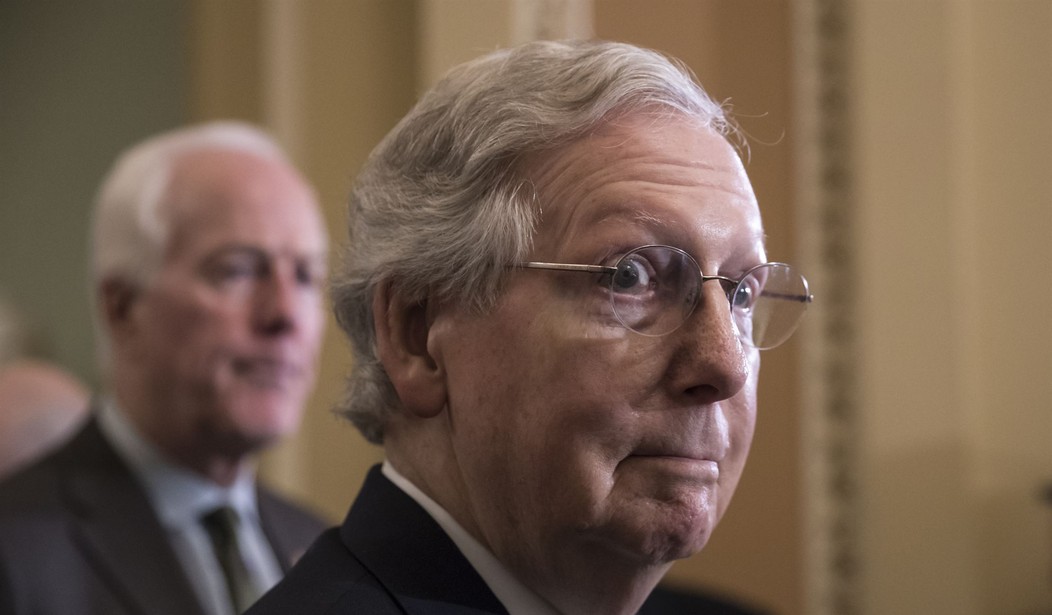Earlier this month, a bipartisan (and not just Mitt Romney) group of Senators announced a “framework” for gun control legislation. Here’s the compromise: the crowd that believes gun confiscation is physically possible, legally permissible, and effective gets federal funding for “red flag” laws that allow law enforcement to strip dangerous people, however defined, of their weapons with minimal process. In return, the crowd that believes guns-don’t-kill-people, crazy-people-kill-people, gets “major investments to increase access to mental health and suicide prevention programs,” including telehealth and school mental health resources.
But, like most of our attempts to throw money and red tape at deep societal problems, this bill only threatens to make our nation’s problems worse.
As conservatives have rightly pointed out, no mentally stable person commits a mass shooting. So, the vast amount of mental health funding promised in the bipartisan gun package seems like a laudable goal. When Texas Governor Greg Abbott first addressed the press following the massacre in Uvalde, he frequently mentioned that mental health problems were severely hurting that part of the state and the local counties lacked sufficient resources to deal with them.
It’s true that Americans struggle with mental health issues at an alarming rate. 42% of American adults experienced an anxiety or depressive disorder in 2021. Teenagers suffer more so. From 2009 to 2021, the share of American high-school students who say they feel “persistent feelings of sadness or hopelessness” rose from 26% to 44%, making 2021 the highest level of teenage sadness ever recorded.
But throwing taxpayer money at meds and couch sessions won’t solve the problem. Instead, we should be asking why, as a society, we’re so sad, anxious, and crazy.
Family Structure
In a pre-COVID study, 90% of kids admitted to an Illinois behavioral health unit came from broken families. It’s not just the trauma of a divorce that can affect children, but other side effects—less individualized attention at home, increased risk of abuse from step-parents or domestic partners, poverty, poorer eating habits, and so on.
Recommended
And yet we continue to undervalue the two-parent home. In 1960, only 9% of children were raised without their father, but today it’s 25%.
Policies pushed by politicians on the Left continue to exacerbate the crisis of the broken family. For example, the Build Back Better bill carries a plethora of marriage penalties, such as daycare subsidies, incentivizing divorce or lack of marriage in the first place. These backward incentives will worsen what we’re already seeing: 40% of American children are today born outside of wedlock (up from 4% for white and 26% for black children in 1965).
Godlessness
Loneliness fuels depression and other mental health issues. For generations, Americans had someone to turn to. Someone who loved us, who also experienced hardship, and who judged, but forgave. God. Through God, we also gained a community—members of our church who shared our values and helped us solve problems.
Sure enough, research suggests that religiosity reduces suicide rates, alcoholism, and drug use. Multiple studies have demonstrated that being religious serves as a buffer against depression, and can even change our brain to better regulate emotional responses.
But, as a nation, our belief that God exists is on the decline. And for the first time, less than half of American households are members of a church.
The mainstream media disparages Christianity as an untrustworthy Donald Trump movement. It’s been decades in the making: Happy Holidays has long replaced Merry Christmas lest religion creep its way into an innocuous sentence. We’ve moved mountains to de-religion our society, and now Americans don’t have God to turn to.
This is Purposeful
Depression is not caused by a lack of counseling, or funding for it. More people are actually getting treatment now than ever before. Nor does mental health funding seem to actually reduce mental health episodes: the map of state spending on mental health and the map of states that still experience mental health issues could not be less aligned. We need to focus on something different, if we care about solving our nation’s mental health crisis.
On a deeper level, we haven’t reached this mental health crisis by accident. The Left has worn down our social fabric, leaving us less reliant on our families, churches, and communities, and more reliant on the federal government. That toxic recipe keeps the Left in power, but devastates those now reliant on a vast bureaucracy never meant to serve as their mother, father, friend, or God.
Any serious attempt to solve the mental health crisis must start with the acknowledgment that government cannot play these roles, only our parents, spouses, and our God can play them. Because the bipartisan gun bill is an expensive way to increase reliance on the federal government, it serves only to make our mental health problems worse.
May Mailman is a senior legal fellow at Independent Women’s Law Center.
























Join the conversation as a VIP Member